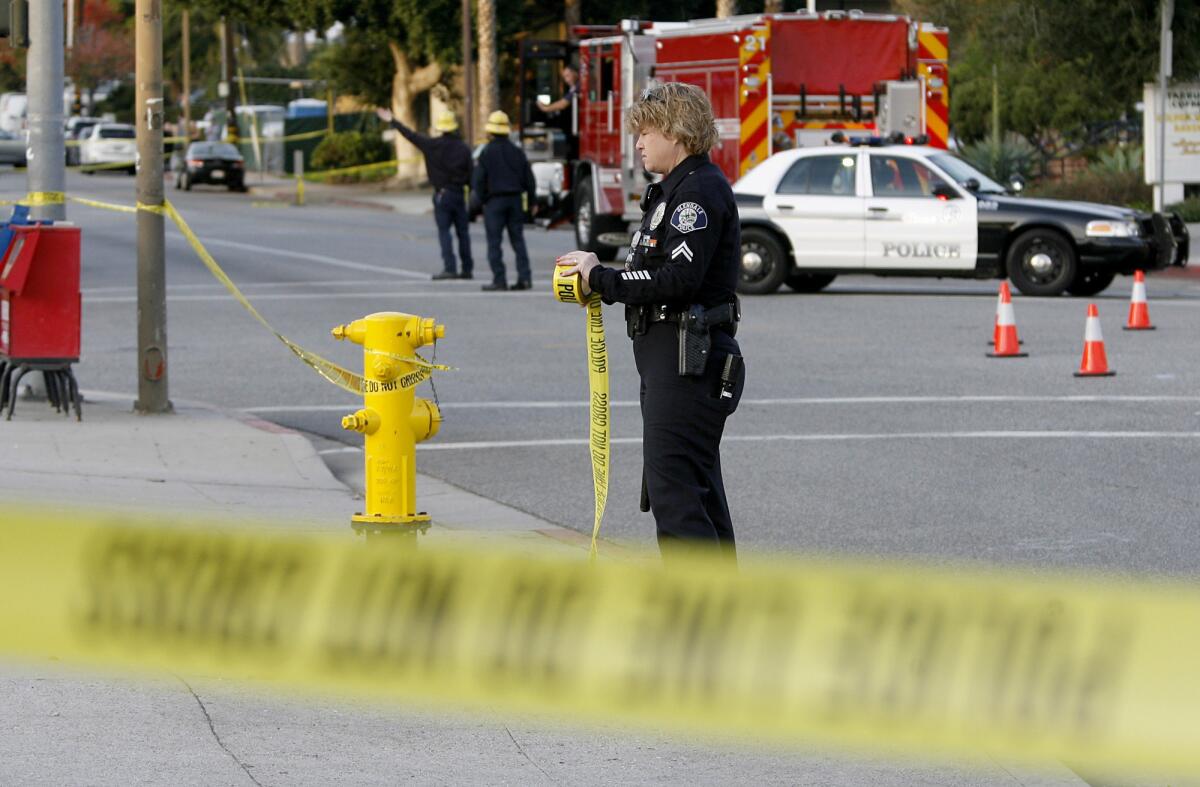Loss of utility tax revenue could reduce police and fire services, city officials fear

A Glendale police officer closes off a street near where a suspicious package was found in this 2012 file photo.
A potential repeal of the utility users tax in June could spell a $17.5-million loss for the city that could come in the form of reduced police and fire services and response times, according to city officials.
While laws prevent the city from advocating for or against local ballot measures, public safety and other city officials painted a doom-and-gloom scenario at the council meeting on Tuesday.
NEWSLETTER: Stay up to date with what’s going on in the 818 >>
Late last year, a measure to eliminate the tax residents pay with their bills for electricity, water and gas garnered enough signatures to qualify for the ballot in June.
Council members asked for a report on what impacts an annual loss of $17.5 million from the city’s coffers could mean, and one of the options on the table could be to have a smaller police and fire force by contracting with the Los Angeles County Sheriff’s and Fire departments for those services.
“If you want the same level of service … well then, you can’t get rid of the utility users tax,” said City Manager Scott Ochoa.
Cuts would have to be made to the local DNA crime lab, jail, records department and patrolling officers, he said.
A contract with the county would mean the Glendale Police Department would be abandoned to be able to make the shift in agencies, said Police Chief Robert Castro.
Shared resources such as a jail and records bureau would cost less, but there would still be fewer officers on the street because an average sworn-in sheriff’s deputy costs more than an average Glendale police officer, he said.
A local police officer costs $175,831 annually, while a deputy costs $180,494, according to a report compiled by the city.
And Glendale officers typically have faster response times. It takes them 4.1 minutes to respond to an emergency, while in Lancaster, which contracts with the county, it takes deputies five minutes, according to the report.
When it comes to routine, non-emergency calls, it takes Glendale police officers 9.9 minutes to respond, while in Palmdale, it can take up to an hour and 20 minutes, the report states.
“We are so much faster and quicker in every category than they are,” said Councilwoman Paula Devine.
Castro gave an example of a recent response to a residential burglary in Chevy Chase Canyon, where local police and a Glendale police helicopter found and arrested the two suspects within minutes.
Having a county contract would mean sharing resources such as a police helicopter, meaning longer response times, he said.
“Rolling those resources out from many other parts of the county, you’re just not going to have that type of response,” Castro said.
“If you want the same level of service ... well then, you can’t get rid of the utility users tax.”
— Glendale City Manager Scott Ochoa
Mayor Ara Najarian said Glendale would face a completely different policing model if a switch was necessary.
“We wouldn’t fall into chaos, clearly, but with this slide, we’d be facing a much longer time for responses in every category,” he said.
Glendale Fire Department Chief Greg Fish said he has been with the department for 29 years and one of the strengths of having a local department is that fire personnel tend to stick around longer rather than transferring.
Bill Taliaferro is one of the circulators of the petition to place the proposed repeal the utility users tax on the ballot and gathered enough signatures for it to qualify to go before voters.
He said he respects the work done by the police and fire departments, but he says there should be room somewhere to cut $17.5 million.
Taliaferro pointed to the 2014 city salaries on Transparent California, which lists more than 150 employees who earned more than $200,000 a year in wages and benefits.
“You have to stretch somewhere … maybe we do need to cut back in certain areas, but if not now, when?” he said in a phone interview. “When are we going to do anything? Why is there always an excuse that we can’t do it now?”
An upcoming presentation at a future council meeting will give an overview of the cuts that could be made to other departments, including parks and libraries. Ochoa said that, for the most part, both those programs could be eliminated.
The utility users tax was established in 1969 and is a 7% tax on electricity, gas and water bills.
--
Arin Mikailian, arin.mikailian@latimes.com
Twitter: @ArinMikailian
--
ALSO:
As dual-language immersion reaches Glendale middle schools, officials eye offerings
Energy savings led Glendale Unified to install more solar panels
City Council, GUSD officials meet to discuss expansion of One Glendale program
